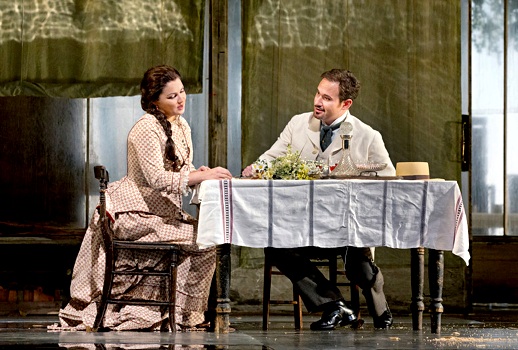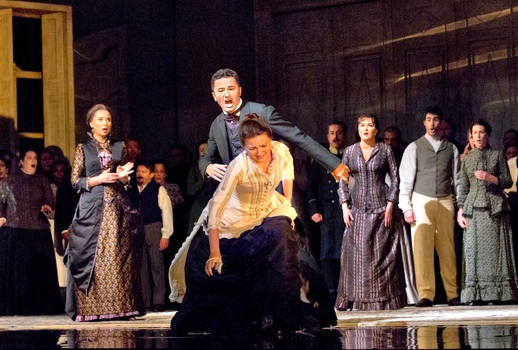
An experienced cynic is confronted with the passionate devotion of a romantic sensibility—that’s Eugene Onegin in a nutshell: Alexander Pushkin is the sophisticated poet-novelist, his work set to music by the far less cynical Pyotr Ilych Tchaikovsky. Tchaikovsky was so aroused by the story (which had been causing Russian hearts to swoon for half a century) that he wanted to change the ending, having the (now married) Tatiana run off with the (newly infatuated) Onegin. In a sense, we all desire that, just as we want Juliet to wake up before Romeo swallows poison. We want this tale to be ordinary, to end with smiles; that’s what the poet wants us to want. Then, as Gypsy’s Madame Rose no doubt advised him, he doesn’t give it to us.
The story goes that a great lady of more truly Russian faith took Tchaikovsky to the garden and reasoned with him, entreated him, pointed out that we just wouldn’t care about these two people if their love came to a dull, happy end, however briefly. No one can believe that Onegin, that avatar of Don Juan and Valmont and Julien Sorel, wouldn’t tire of Tatiana as soon as she succumbed—anyway, Tatiana doesn’t believe it, and I’m inclined to think she’s right.

It was Netrebko’s night. She’s still a beautiful woman, with a figure ampler than in previous seasons, her voice, too, has expanded to grand opera size without losing its quality or developing the thin or guttural habits of many another Russian diva. How has she combated that? My guess: Plenty of Italian vocalises in her ongoing training. She gives Tatiana’s emotional outpourings an intensity, a shimmering beauty that thrills the house, but she keeps lighter, brisker, bell-like tones for social interactions.
Warner—and not her sub-director, Fiona Shaw, I presume, since the snowy finale has been foreshadowed in all the Met press materials since last winter—is the sort of director who does not make vast changes in story or place or time (she’s set the piece in Tchaikovsky’s Russia not Pushkin’s, so the ladies wear bustles), but who can’t quite leave well enough alone. She has to do something to be sure we notice she’s been there, twiddling. So the first act is set, not in the elegant loggia or garden of a Russian manor house but in the farm buildings where new-harvested vegetables are sorted. This permits Onegin to underline his indifference to Tatiana’s feelings by squeezing a tomato or biting into an apple now and then. He concludes the scene by giving her a cynical kiss on the lips. (This is a very oral Onegin: He also noshes on a sandwich while preparing to duel with Lenski.)

Or so I infer. Is she just remembering Act I? Would she change her mind if he kissed well enough? No hint from Tchaikovsky, who didn’t consider this kiss in his scenario, or from Valery Gergiev in the orchestra, who simply stops dead for a minute or two. (How did Warner—or Netrebko—or whoever it was—persuade him to play along with this “tonsil-hockey is better than music” moment? He doesn’t strike me as easily cowed.) It’s an annoying, unnecessary moment, but at least Onegin has stopped stuffing his face.
Another problem with the staging was the duel, performed with shotguns rather than dueling pistols on a frozen swamp covered in romantic mist. (Great mist, somebody!) I’ve never heard of a duel with shotguns; at that range it would be insane. No doubt someone will cite an instance where shotguns were used, but for me it’s Hedda Gabler’s pistols or you might as well Indian wrestle. Or chess. Chess to the death. Very Russian.
Mariusz Kwiecien was in lustrous voice, dark and masculine, as long as the ironic Onegin held the stage, and he waltzes as well as he paces. Has he outgrown his bad habits at last? Only while he maintained his Pushkinian ironic distance. As soon as he lost his composure in Act III on remeeting—and adoring—Tatiana, his tendency to oversing, to bluster, to attempt to force a larger sound from his lungs than they are capable of producing was back. He seems to feel big emotions require bigger sound. As he is not capable of more sound, he would be wiser to take them quietly. He is far more effective, passionate or sinister, when he does not yell. These emotions can be put over, vocally, subtly, and he is too intelligent an actor not to know this. But passionate situations carry him away.

How many times has Gergiev conducted this opera? Far more than the Met has presented it (136), even counting Russian company visits. You wouldn’t know this from the score’s youthful fire on the present occasion, the way melodies danced from one instrument to another behind the social persiflage in which nothing was said and everything communicated. The dancing, by the way, was especially lively in the two party scenes, and a nice variety of ages and sizes seemed to be giving themselves up to it. (Of course, the upper classes at Petersburg parties did dance well—what else did they have to do?) The Met has pretty much discharged its corps de ballet, but the pickup artists under Kim Brandstrup’s direction made quite lively pictures of the Name-Day cotillion and the Gremins’ polonaise.
Tom Pye’s sets, with mirrors to extend apparent views, made much use of rooms opening into rooms, as if to emphasize that, in this opera, we often move from private to public personae. I did not care for the rundown barn and vegetable bins of Act I, but the Larins’ ballroom looked right and the pillars of St. Petersburg glimmered icily in Jean Kalman’s lighting. Chloe Obolensky’s costumes could hardly compete with the opening night crowd observing them, but Tatiana’s crimson number (a bit too imperial—she’s only a general’s wife, not royalty) and Olga’s two-toned party gown and blue afternoon dress played the proper role of making the characters easy to follow on a crowded stage.
Photos: Ken Howard.


